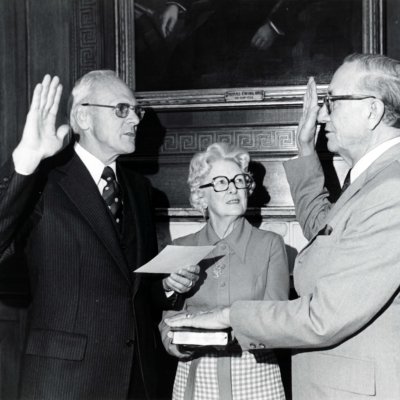Bureau of Indian Affairs
Ben Reifel began his career working for the Bureau of Indian Affairs beginning in 1933. His knowledge of the Lakota language and his relationship with many reservation residents was helpful in promoting new programs under the Indian Reorganization Act of 1934. Though there were many who did not like this act, Ben was successful in winning support for it. Because he spoke the Lakota language, knew the people, and had many relatives and friends, Ben was given the responsibility to make the programs of the Bureau effective in South Dakota reservations.

Reifel was a member of the United States Army Reserve since his commissioning at South Dakota State College in 1932. He was called to active duty in the spring of 1942 causing him to leave his position with the Bureau of Indian Affairs in Pine Ridge. After serving four years during World War II, he was appointed superintendent of the Fort Berthold Indian Reservation in North Dakota. This position was interrupted by his acceptance into a graduate program at Harvard University. After receiving his Ph.D., he returned to South Dakota as superintendent of the Pine Ridge Reservation. He was then appointed to director of the Aberdeen Area Bureau of Indian Affairs Office. He was responsibility for all the reservations, hospitals, and schools in North Dakota, South Dakota and Nebraska.
Ben Reifel was commissioned as a member of the United States Army Reserve in 1932. He was called to active duty in the spring of 1942. After a tour at Fort Leavenworth, he was assigned to Fort Bliss. He later served at Camp Chaffee, Arkansas, a post that detained German prisoners of war. Following Japan’s attack on Pearl Harbor in 1941, Reifel was transferred to Europe to serve in France and Germany.
In 1946, he was released from active duty and returned to South Dakota. He had achieved the rank of Lt. Colonel.
Ben Reifel Papers
Learn more about Ben Reifel's life before representing South Dakota in Washington by diving into his papers. A large selection of the Benjamin Reifel Papers is available online through the Digital Library of South Dakota.









